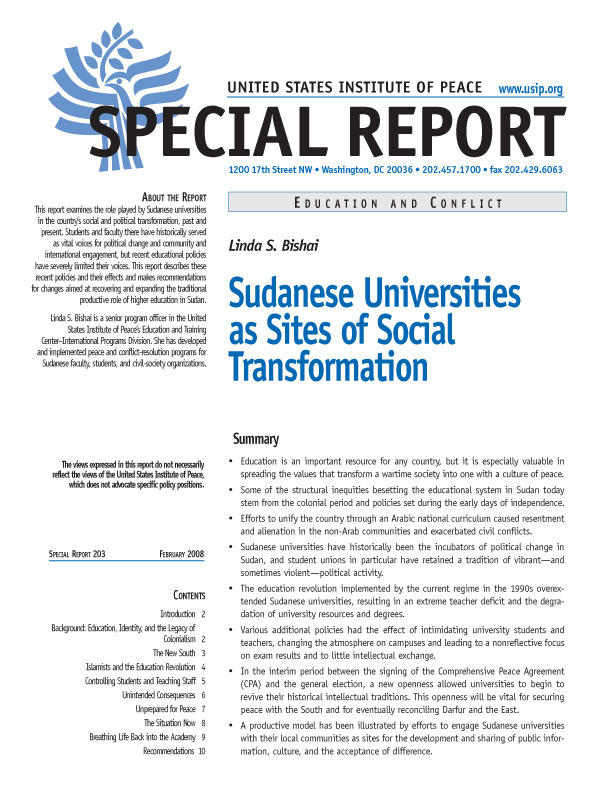In Sudanese universities, students and faculty have historically served as vital voices for political change and community and international engagement, but recent educational policies have severely limited their voices.

Summary
- Education is an important resource for any country, but it is especially valuable in spreading the values that transform a wartime society into one with a culture of peace.
- Some of the structural inequities besetting the educational system in Sudan today stem from the colonial period and policies set during the early days of independence.
- Efforts to unify the country through an Arabic national curriculum caused resentment and alienation in the non-Arab communities and exacerbated civil conflicts.
- Sudanese universities have historically been the incubators of political change in Sudan, and student unions in particular have retained a tradition of vibrant--and sometimes violent--political activity.
- The education revolution implemented by the current regime in the 1990s overextended Sudanese universities, resulting in an extreme teacher deficit and the degradation of university resources and degrees.
- Various additional policies had the effect of intimidating university students and teachers, changing the atmosphere on campuses and leading to a nonreflective focus on exam results and to little intellectual exchange.
- In the interim period between the signing of the Comprehensive Peace Agreement (CPA) and the general election, a new openness allowed universities to begin to revive their historical intellectual traditions. This openness will be vital for securing peace with the South and for eventually reconciling Darfur and the East.
- A productive model has been illustrated by efforts to engage Sudanese universities with their local communities as sites for the development and sharing of public information, culture, and the acceptance of difference.
- The international community should advocate creative collaboration, research, and teaching exchanges both to and from Sudan, encourage international conferences involving Sudanese students and faculty, and pay active attention to restoring Sudanese libraries and research facilities.
- Sudanese education officials, university faculty, and civil-society organizations should work together to counter four key educational problems: the lack of exposure to critical thinking and research skills; the lack of vibrant extracurricular life; the alienation of universities from their local communities; and the recurring pattern of violent student activism.
About the Report
This report examines the role played by Sudanese universities in the country’s social and political transformation, past and present. Students and faculty there have historically served as vital voices for political change and community and international engagement, but recent educational policies have severely limited their voices. This report describes these recent policies and their effects and makes recommendations for changes aimed at recovering and expanding the traditional productive role of higher education in Sudan.
Linda S. Bishai is a senior program officer in the United States Institute of Peace’s Education and Training Center–International Programs Division. She has developed and implemented peace and conflict-resolution programs for Sudanese faculty, students, and civil-society organizations.